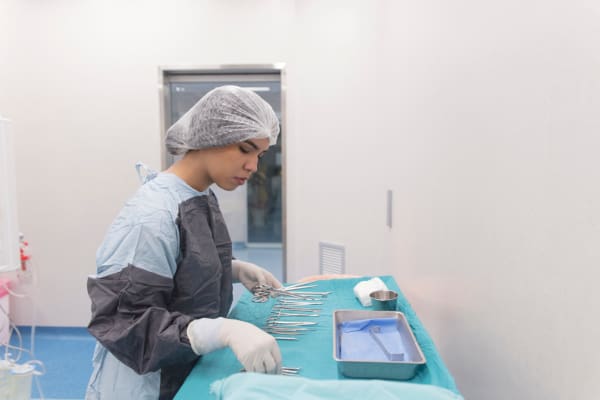Is Becoming a Surgical Technician Worth It?
Exploring the Rewards and Challenges of Pursuing a Career in Surgical Technology
If you’ve ever thought about diving into the medical field and becoming a surgical technician, you’re in for an exciting ride. Surgical technologists are the unsung heroes of the operating room. They work closely with surgeons and other healthcare professionals to ensure that surgeries run smoothly and safely. If you’re considering a career as a surgical technologist, you may be wondering if it’s worth it.
In this post, we’re going to take a deep dive into the world of surgical technology. We’ll cover everything from what it takes to get started as a surgical tech, the educational requirements, and the certification exams you’ll need to conquer. Additionally, we’ll explore the rewarding aspects of this career, like the annual salary, hands-on involvement in surgical procedures, and the personal fulfillment that comes with helping patients in the operating room.
On the flip side, we’ll also address the challenges you might encounter, such as the high-pressure work environment, physical demands, and the need for continuous learning. So, grab a seat, get comfortable, and let’s explore whether becoming a surgical technician is the right path for you!
Is it hard to become a surgical tech?
First, you may be wondering if becoming a surgical tech is a tough road. Well, fear not, it’s not as intense as the journey to becoming a registered nurse (RN), but it does require some solid academic groundwork in biology, anatomy, and physiology. To embark on this exciting career, most surgical tech programs look for candidates with a high school diploma or an equivalent qualification. Some programs may even require you to have completed prerequisite coursework in math and science.
But here’s where the real magic happens! It’s not all theoretical knowledge; you’ll get hands-on experience through clinical rotations in the operating room. This crucial aspect of the program allows you to learn the essential skills and techniques required to excel as a surgical technologist.
So, while the path to becoming a surgical tech might not be as grueling as some other medical professions, it still demands dedication and hard work. Embrace the learning process, and you’ll be well-prepared to make a significant impact in the operating room and contribute to the field of surgical technology.
Educational Requirements and Certification Exams
Alright, let’s talk about how you can become a surgical technician. The good news is that it’s not as challenging as you might think!
To embark on this thrilling journey, you’ll need a high school diploma or equivalent. With that in hand, you can enroll in a certified surgical technologist program. Various allied health education institutions and vocational schools offer these programs.
During your course, you’ll delve into the fascinating world of surgical technology. You’ll learn the ins and outs of surgical procedures, the nitty-gritty of maintaining a sterile environment, and the critical art of patient care. Once you’ve completed the program, you’ll be on the path to becoming a Certified Surgical Technologist (CST).
To get that coveted certification, you’ll need to pass the certification exams conducted by organizations like the National Center for Competency Testing (NCCT) or the National Board of Surgical Technology and Surgical Assisting (NBSTSA). Getting certified showcases your competency and dedication, setting the stage for a rewarding career ahead.

Job Growth and Career Opportunities
Before we delve into the pros and cons of this profession, let’s address job prospects. You might be wondering if the demand for surgical technicians is going to stand the test of time. Well, here’s some good news – it’s a thriving field! As medical technology advances and our population grows older, the need for skilled surgical technologists is only going to increase.
According to the Bureau of Labor Statistics (BLS), the job outlook for surgical technologists looks bright. It’s projected to grow at a faster-than-average rate compared to other occupations. So, if you’re worried about finding job opportunities, rest assured that you’ll have plenty of doors open in hospitals, surgical centers, and outpatient care facilities.
Rewards of Being a Surgical Technician
- Annual Salary: Let’s talk moolah! While being a surgical technician might not land you in the same income bracket as a surgeon, it’s still pretty decent. Your exact salary will depend on factors like your experience, location, and the healthcare facility you work at. On average, though, you can expect a competitive annual salary that provides financial stability.
- Hands-on Action: If you’re someone who thrives on action and loves being in the heart of things, being a surgical tech is right up your alley. As a crucial part of the surgical team, you’ll be right there in the operating room, working side by side with surgeons. Your responsibilities will include prepping the surgical room, ensuring all instruments are ready, and assisting during the procedures. Your contribution can make all the difference between a successful surgery and an exceptional one!
- Personal Fulfillment: The sense of fulfillment you get from being a surgical technician is unparalleled. You’re part of the team that helps save lives and improves the well-being of patients. Knowing that your skills and dedication play a role in positively impacting someone’s life can be incredibly gratifying and heartwarming.
Challenges in the Field

- Intense Work Environment: Brace yourself for an intense work environment! The operating room can be fast-paced and high-pressure, especially during critical surgeries.
Staying focused and level-headed in these situations is essential for the well-being of the patient. If you thrive in a high-octane atmosphere, this might be a great fit for you. But if stress isn’t your cup of tea, you might want to think twice. - Physical Demands: Get ready to stay on your feet! Surgical technicians spend long hours standing during procedures, and they may be required to assist in moving patients. This physical demand can be challenging, so maintaining good physical health is essential.
- Lifelong Learning: The medical field is ever-evolving, and surgical technology is no exception. To stay on top of your game, you’ll need to commit to continuous learning and stay up-to-date with the latest advancements and techniques. This dedication to learning is crucial to maintain your Certified Surgical Technologist status and excel in your career.
There you have it – a comprehensive look at the world of surgical technology! Becoming a surgical technician can be an incredibly rewarding career choice for those who are passionate about the medical field and thrive in the fast-paced environment of the operating room. With decent earnings, hands-on involvement in life-changing procedures, and the satisfaction of knowing you make a difference in patients’ lives, it’s undoubtedly worth considering.
Is a Surgical Tech Career Right for Me?
If you’re considering a career as a surgical technologist, here are a few tips for deciding if this career is right for you:
- Do you have a strong interest in the medical field?
- Are you comfortable working in a fast-paced and demanding environment?
- Are you able to follow directions and work as part of a team?
- Are you able to remain calm and focused under pressure?
If you answered yes to these questions, then a career as a surgical technologist may be a good fit for you.
However, remember that this profession does come with its fair share of challenges, such as the high-pressure work environment and physical demands. Continuous learning and adaptability are key to staying ahead in this dynamic field. So, weigh the pros and cons, consider your strengths and passions, and if becoming a surgical technician resonates with you, take that leap! It might just be the start of an exciting and fulfilling career in the thrilling world of surgical technology!

